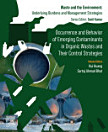Microbial Nexus for Sustainable Wastewater Treatment: Resources, Efficiency, and Reuse
About this ebook
Features:
- Unveils the potential of high-throughput microbial biotechnology for transforming wastewater management.
- Describes the microbial nexus involved in the biodegradation of pharmaceutical micropollutants.
- Highlights the valuable materials recoverable from wastewater, associated challenges, and diverse opportunities arising from effective wastewater management.
- Covers advanced bioremediation technologies designed to handle emerging pollutants. Demonstrates the integration of nanotechnology with bioaugmentation, exploring potential advantages and disadvantages that shape the future of wastewater treatment.
- Provides insights into adopting a circular economy model aligning with sustainable development goals for resource extraction.
This book is tailored for graduate students and researchers in wastewater treatment, waste valorization, environmental engineering, and hazardous waste management.
About the author
Vineet Kumar is currently a National Postdoctoral Fellow in the Department of Microbiology, School of Life Sciences at the Central University of Rajasthan, Rajasthan, India. He got his M.Sc. (2008) and M.Phil. (2012) in Microbiology at Ch. Charan Singh University, Meerut, India. Subsequently, he earned his Ph.D. (2018) in Environmental Microbiology from Babasaheb Bhimrao Ambedkar (A Central) University, Lucknow, India, focusing on the treatment of distillery effluent in two step treatment system, towards environmental sustainability.
Sunil Kumar is a well-rounded researcher with more than 22 years of experience in leading, supervising, and undertaking research in the broader field of Environmental Engineering and Science with a focus on Solid and Hazardous Waste Management. Dr. Kumar is a graduate in Environmental Engineering and Management from the Indian Institute of Technology, Kharagpur, India. He completed his Ph. D. in Environmental Engineering from Jadavpur University, Kolkata, India. His primary area of expertise is solid waste management (Municipal Solid Waste, Electronic waste etc.) over a wide range of environmental topics including contaminated sites, EIA, and wastewater treatment.
Pradeep Verma is working as Professor in the Department of Microbiology, School of Life Sciences at Central University of Rajasthan, Rajasthan, India. He is a well-rounded researcher with more than 21 years of experience in leading, supervising, and undertaking research in the broader field of bioprocess and bioenergy production from lignocellulosic waste with a focus on waste management. He earned his PhD in Microbiology from Sardar Patel University Gujarat, India in 2002. His research area of expertise involves microbial diversity, bioremediation, bioprocess development, lignocellulosic and algal biomass based biorefinery.
Sartaj Ahmad Bhat is working as JSPS Postdoctoral Researcher at the River Basin Research Center, Gifu University, Japan. He received his Ph.D. in Environmental Sciences from Guru Nanak Dev University, Amritsar, India in 2017. His research interests focus on vermicomposting treatment of various solid wastes, especially for investigations on fate and behavior of emerging pollutants during biological treatment of organic wastes.






